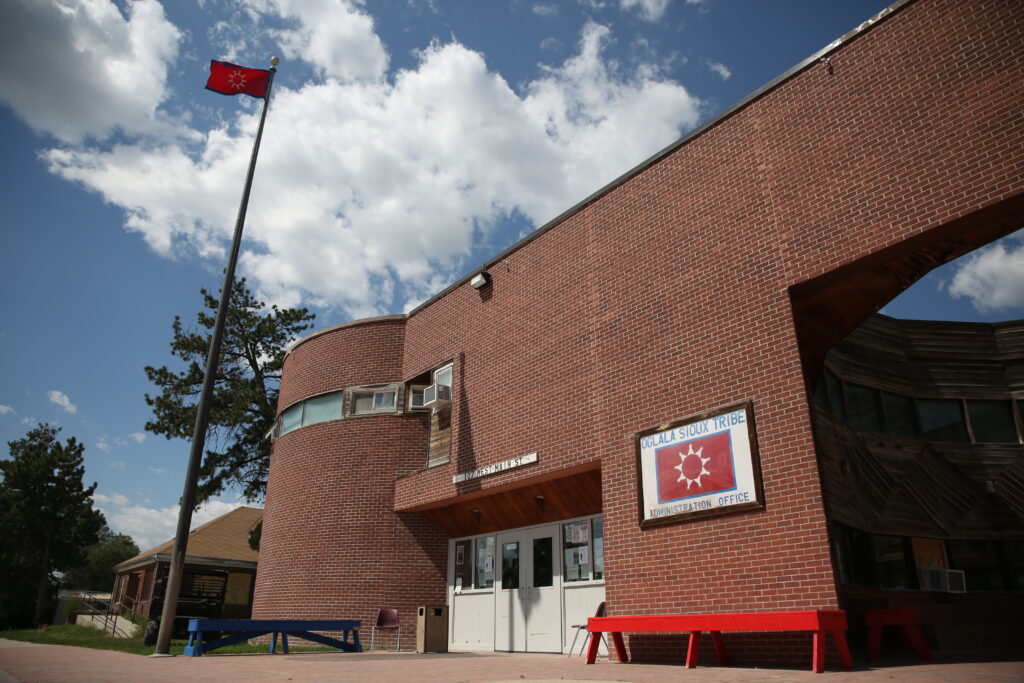
Makenzie Huber/South Dakota Searchlight
Two tribal leaders in South Dakota are demanding Gov. Kristi Noem apologize for comments she made about tribal governments at town halls last week.
The president of the Rosebud Sioux Tribe released a statement over the weekend calling the comments defamatory and racially prejudiced. The president of the Oglala Sioux Tribe released a statement Monday calling the comments malicious, incendiary and demeaning.
Noem told attendees at a Winner town hall that she believes tribal leaders are “personally benefiting” from drug cartels. At a town hall in Mitchell, she said tribal children “don’t have parents who show up and help them,” and tribal members “have a tribal council or a president who focuses on a political agenda more than they care about actually helping somebody’s life look better.” She did not offer evidence supporting the comments.
Oglala Sioux Tribe President Frank Star Comes Out said her comments ignore the work being done by his administration to expand broadband services and invest in dams and infrastructure, among other initiatives. Star Comes Out also serves as the chairman of the Great Plains Tribal Chairmen’s Association.
“How dare the governor allege that Sioux Tribal Councils do not care about their communities or their children and, worse, that they are involved in nefarious activities,” Star Comes Out said.
Earlier this year, tribal leaders and tribally enrolled legislators criticized comments Noem made about drugs on South Dakota reservations during a speech to lawmakers about the U.S.-Mexico border. In that speech, Noem made multiple references to the ravages of fentanyl and other drugs on reservation communities, and said the drugs are coming from Mexican cartels.
Noem was banned from the Pine Ridge Reservation for a second time after her border remarks in February.

“You can’t build relationships if you don’t spend time together,’” Noem said in February in response to the ban. “I stand ready to work with any of our state’s Native American tribes to build such a relationship.”
Star Comes Out declared a state of emergency on the Pine Ridge Reservation last year due to increasing crime. A judge ruled last year that the federal government has a treaty duty to support law enforcement on the reservation, but declined to rule on the funding level the tribe sought.
The governor has offered to enter into a law enforcement agreement with tribal governments to have South Dakota Highway Patrol officers assist in enforcing tribal law on reservations, according to a letter she sent to tribal leaders in late February.
In the letter, she invited the leaders to meet with her in Pierre or invite her to their tribal nations to discuss the issue further.
Rosebud Sioux Tribe President Scott Herman said Noem’s most recent remarks were “made from ignorance” and intended to fuel a “racially based and discriminatory narrative towards the Native people of South Dakota.”
“If the governor is truthful about wanting to work with tribal nations on issues of education, economic development and law enforcement, she should take the time to contact tribal leaders before making racist, unsubstantiated and discriminatory attacks of tribal people,” Herman said.

Noem’s spokesman Ian Fury told South Dakota Searchlight she called President Herman on Monday and “left him yet another voicemail,” and that she’s also trying to schedule a meeting with Oglala Sioux Tribe leadership. While Fury said she hasn’t received a response, she has been engaging with tribal community members.
“We would challenge the tribes to prove the governor’s comment false by banishing the drug cartels from their reservations,” Fury said in a text message.
Noem also told town hall attendees she wants to improve Native American student success, while criticizing tribal leaders and parents for low success rates.
Chronic absenteeism among South Dakota’s Native American students attending public school increased from 31% to 54% from 2018 to 2023 – the highest among all South Dakota student demographics. A third of Native American public school students don’t complete high school, 84% are not considered college and career ready, and only 7% take the ACT, according to the latest data from the state Department of Education.
Star Comes Out called on Noem to “engage in meaningful dialogue and collaboration with tribal leaders” to address problems in South Dakota and reservation communities.
“It is only through genuine partnership and mutual respect that we can work towards a future of prosperity and justice for both Indian and non-Indians residing in South Dakota,” Star Comes Out said.
